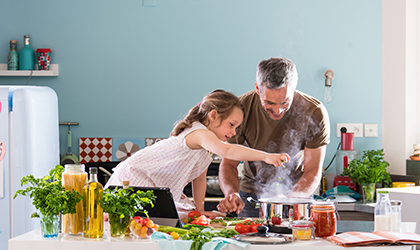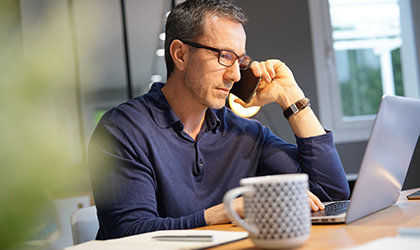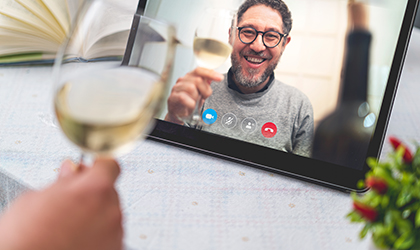
Stay connected
Some quick housekeeping: social distancing is physical distancing from people; confusingly, it’s not social distancing. Human beings are social beings. And social connectedness is intrinsic to our overall health. In fact, connection is said to be one of the strongest predictors of longevity and happiness. And in the current climate, we need to stay connected – safely, of course – as much as possible.
Make the most of technology
While virtual communication apps are by no means a surrogate for face-to-face interaction, the likes of FaceTime, Skype, and WhatsApp are poised to be a pretty heroic middle ground for the time being. Sure, the Zoom fatigue is real, but try to make an effort to speak to loved ones as much as possible. If you don’t have the energy, that’s completely fine. But try to remember how much better you often feel after speaking to a family member or good pal.
Spread kindness
Dr. David Hamilton is a passionate proponent of kindness. He believes channelling kindness is one of the best tools for good mental health, bolstering overall wellbeing, neutralising fear and improving social connectedness.(1) Scientifically speaking, kindness cultivates the love hormone, oxytocin. Kindness also creates a ripple effect. The kinder you are to others, the kinder they will be and so on. And the world needs as much kindness it can get right now.
Random acts of kindness
-
Send a friend who’s struggling some flowers
-
Host a free online Zoom course/webinar if you have a skill
-
Buy supplies for a vulnerable neighbour
-
Volunteer as a telephone befriender to someone who’s shielding
-
Leave small gifts for delivery drivers
-
Tell family members how much you love and appreciate them
-
Donate to a charity or food bank
-
Send someone a free takeaway meal
-
Make a cup of tea for a loved one
Did you know?
Random acts of kindness may lower blood pressure and support the immune system.
Battle loneliness
According to a study of UK adults conducted nine months into Covid-19 restrictions (around late November), one in four (24%) reported they had experienced loneliness in the previous two weeks.(2) Regrettably, these statistics aren’t surprising. Our efforts to stop the spread of the virus have given rise to isolation and disconnection. Paradoxically, however, we aren’t alone in feeling alone. Feeling lonely is a perfectly understandable response to the challenging situation at hand.
What to do if you feel lonely?
It is understandable to feel lonely as so many of us are separated from friends and loved ones. Remind yourself that the disconnection we’re currently facing won’t last forever. Soon enough, the everyday connections that make us feel human will fill our lives again. In the meantime, here are some ways you can support yourself.
-
Join an online group or class that focuses on something you enjoy
-
Consider going for short walks in public places (while social distancing)
-
Enjoy the background hum of the radio, podcasts, or audiobooks
-
Make an effort to be more social: reconnect with old friends and colleagues, set up a WhatsApp group dedicated to pandemic support and reach out to friends little and often
-
Do more activities you enjoy: exercise, walking, cooking, or mindfulness
What do to if you know someone is lonely?
Loneliness is ubiquitous at the moment. Whether you live alone, are shielding or struggling with mental health issues, feeling detached from the world and loved ones is only natural. If you know someone is feeling lonely, here are a few simple and generous ways you can brighten their day.
-
Leave homemade baked goods on their doorstep
-
Send a motivational text or voice note
-
Handwrite them a thoughtful card
-
Arrange to watch a film at the same time as them
-
Organise weekly check-ins and be sure to honour them
-
Schedule virtual lunch or dinner dates
-
If they aren’t tech-savvy, help them use virtual communication apps
Nurture relationships
Although the very act of staying connected in this disconnected time is vital for our wellbeing, we also need to think about how we nurture our relationships – with the people we live with, with friends, with family members, even with the natural world around us. Hint: patience and compassion are key here.
The five pillars of healthy relationships
According to the Mental Health Foundation, adhering to the following principles can make a big difference to the relationships in your life at the moment.(3)
-
Give time: schedule and honour plans to reconnect with your loved ones
-
Be present: refrain from multitasking or using your phone when you chat with your friends and family; try to give them your undivided attention
-
Listen: listen actively, be compassionate and validate their experiences
-
Let yourself be listened to: speak sincerely about how you’re doing; allow yourself to be heard and held by others
-
Recognise unhealthy relationships: toxic relationships can make us deeply unhappy. Try to use lockdown as an opportunity to reflect on the relationships that aren’t serving you.
References:
-
Kitching, N., Talent Insight Group, Hamilton, D. R., & Hamilton, D. R. (2020, September 25). Kindness. David R Hamilton PhD. Available online: https://drdavidhamilton.com/category/kindness-2/
-
Wave 8: Late November 2020. (2020, December 18). Mental Health Foundation. Available online: https://www.mentalhealth.org.uk/our-work/research/coronavirus-mental-health-pandemic/key-statistics-wave-8
-
Nurturing our relationships during the coronavirus pandemic. (2021, January 6). Mental Health Foundation. Available online: https://www.mentalhealth.org.uk/coronavirus/nurturing-our-relationships-during-coronavirus-pandemic
Other sources:
-
Hachette.co.uk. 2021. How to stay calm in a global pandemic. Available online: https://www.hachette.co.uk/wp-content/uploads/2020/12/How-to-Stay-Calm-in-a-Global-Pandemic-Free-ebook.pdf
Related Posts
Disclaimer: The information presented by Nature's Best is for informational purposes only. It is based on scientific studies (human, animal, or in vitro), clinical experience, or traditional usage as cited in each article. The results reported may not necessarily occur in all individuals. Self-treatment is not recommended for life-threatening conditions that require medical treatment under a doctor's care. For many of the conditions discussed, treatment with prescription or over the counter medication is also available. Consult your doctor, practitioner, and/or pharmacist for any health problem and before using any supplements or before making any changes in prescribed medications.

Olivia
Olivia Salter has always been an avid health nut. After graduating from the University of Bristol, she began working for a nutritional consultancy where she discovered her passion for all things wellness-related. There, she executed much of the company’s content marketing strategy and found her niche in health writing, publishing articles in Women’s Health, Mind Body Green, Thrive and Psychologies.
View More



